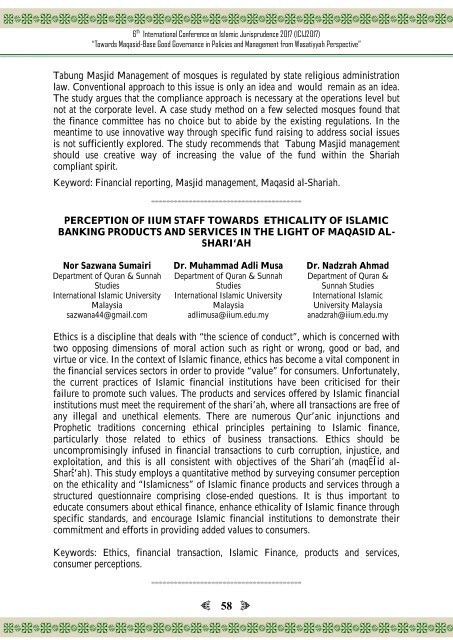PROGRAMME ABSTRACT BOOK
Program%20Book%20ICIJ2017%20-final%2016%20-%202-%202017
Program%20Book%20ICIJ2017%20-final%2016%20-%202-%202017
Create successful ePaper yourself
Turn your PDF publications into a flip-book with our unique Google optimized e-Paper software.
6 th International Conference on Islamic Jurisprudence 2017 (ICIJ2017)<br />
“Towards Maqasid-Base Good Governance in Policies and Management from Wasatiyyah Perspective”<br />
<br />
<br />
<br />
Tabung Masjid Management of mosques is regulated by state religious administration<br />
law. Conventional approach to this issue is only an idea and would remain as an idea.<br />
The study argues that the compliance approach is necessary at the operations level but<br />
not at the corporate level. A case study method on a few selected mosques found that<br />
the finance committee has no choice but to abide by the existing regulations. In the<br />
meantime to use innovative way through specific fund raising to address social issues<br />
is not sufficiently explored. The study recommends that Tabung Masjid management<br />
should use creative way of increasing the value of the fund within the Shariah<br />
compliant spirit.<br />
Keyword: Financial reporting, Masjid management, Maqasid al-Shariah.<br />
<br />
PERCEPTION OF IIUM STAFF TOWARDS ETHICALITY OF ISLAMIC<br />
BANKING PRODUCTS AND SERVICES IN THE LIGHT OF MAQASID AL-<br />
SHARI‘AH<br />
Nor Sazwana Sumairi<br />
Department of Quran & Sunnah<br />
Studies<br />
International Islamic University<br />
Malaysia<br />
sazwana44@gmail.com<br />
Dr. Muhammad Adli Musa<br />
Department of Quran & Sunnah<br />
Studies<br />
International Islamic University<br />
Malaysia<br />
adlimusa@iium.edu.my<br />
Dr. Nadzrah Ahmad<br />
Department of Quran &<br />
Sunnah Studies<br />
International Islamic<br />
University Malaysia<br />
anadzrah@iium.edu.my<br />
Ethics is a discipline that deals with “the science of conduct”, which is concerned with<br />
two opposing dimensions of moral action such as right or wrong, good or bad, and<br />
virtue or vice. In the context of Islamic finance, ethics has become a vital component in<br />
the financial services sectors in order to provide “value” for consumers. Unfortunately,<br />
the current practices of Islamic financial institutions have been criticised for their<br />
failure to promote such values. The products and services offered by Islamic financial<br />
institutions must meet the requirement of the shari’ah, where all transactions are free of<br />
any illegal and unethical elements. There are numerous Qur’anic injunctions and<br />
Prophetic traditions concerning ethical principles pertaining to Islamic finance,<br />
particularly those related to ethics of business transactions. Ethics should be<br />
uncompromisingly infused in financial transactions to curb corruption, injustice, and<br />
exploitation, and this is all consistent with objectives of the Shari’ah (maqÉÎid al -<br />
Sharʑah). This study employs a quantitative method by surveying consumer perception<br />
on the ethicality and “Islamicness” of Islamic finance products and services through a<br />
structured questionnaire comprising close-ended questions. It is thus important to<br />
educate consumers about ethical finance, enhance ethicality of Islamic finance through<br />
specific standards, and encourage Islamic financial institutions to demonstrate their<br />
commitment and efforts in providing added values to consumers.<br />
Keywords: Ethics, financial transaction, Islamic Finance, products and services,<br />
consumer perceptions.<br />
<br />
58


